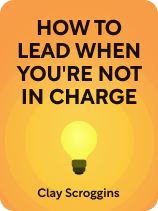

This article is an excerpt from the Shortform book guide to "How to Lead When You're Not in Charge" by Clay Scroggins. Shortform has the world's best summaries and analyses of books you should be reading.
Like this article? Sign up for a free trial here.
Are authority and leadership the same thing? What makes someone a leader without having a position of authority?
Clay Scroggins believes that God gave humanity the responsibility to lead. Unfortunately, you may neglect this responsibility because you mistakenly believe that you must hold a position of authority to be a leader.
Let’s look at authority vs. leadership to show why you don’t need to be in a high position to take charge.
The Danger of Confusing Authority With Leadership
Clay Scroggins explains authority vs. leadership in his book How to Lead When You’re Not In Charge. The belief that you need authority to lead stops you from realizing your true leadership potential: Instead of embracing opportunities to practice leadership and create positive change in your current role, you wait for someone to give you a position of authority.
(Shortform note: In The 5 Levels of Leadership, John C. Maxwell says you do need to hold a position of authority to be a leader. He defines five levels of leadership and says you must progress through them in order, as each level builds to the next. The first level is positional leadership, where people follow you because of your role. Scroggins’s description of leadership largely fits with Maxwell’s second level, where people follow you because they trust you. So, Maxwell says you must hold a position of authority before progressing to trust-based leadership. He doesn’t discuss what people should do before achieving this level, only saying that positions of authority are given to those who show leadership potential.)
Scroggins says waiting for a position of authority can lead you to feel powerless and ultimately dilutes your ability to lead: You’re so used to not having control over the big problems in the organization that you stop taking responsibility for things that are within your control. This passivity means that you’re not challenging yourself or practicing how to overcome failure, decreasing your resilience to setbacks and increasing your fear of failure. When you are given authority, this aversion to responsibility and fear of failure remain, keeping you passive even when you could create large, meaningful change in the organization. To avoid this trap, focus on what you can control in your current position, instead of things you cannot.
| The Psychology Behind Learned Helplessness Scroggins’s ideas about passivity have similarities to the psychological concept of learned helplessness. People develop learned helplessness after repeatedly experiencing traumatic situations that they can’t control. Since they couldn’t control previous situations, they believe they can’t control any future situations either, so they stop trying. This mindset often leads to depression and anxiety. A person’s explanatory style—how they interpret events and their causes—can affect whether they learn helplessness. People with optimistic explanatory styles see negative experiences as temporary and caused by something external, other experts say. They believe things will work out positively in the end, so they have good resilience and are more likely to overcome failure. In contrast, people with pessimistic explanatory styles see negative experiences as unchangeable and caused by personal flaws. They believe failure is permanent, so they struggle to overcome it and have poor resilience—making them more susceptible to learned helplessness. Thus, before they can focus on things they can control, as Scroggins suggests, people who’ve learned helplessness may first need to accurately identify what they can control—what is caused by them and what is caused by something external. Cognitive behavioral therapy may be helpful for doing this. |

———End of Preview———
Like what you just read? Read the rest of the world's best book summary and analysis of Clay Scroggins's "How to Lead When You're Not in Charge" at Shortform.
Here's what you'll find in our full How to Lead When You're Not in Charge summary:
- The risks of confusing authority with leadership
- Why you don’t need to be in a position of authority to be a leader
- How to lead your environment and even your superiors






